Pei-fang is turning green in the
corner. She's waited over a month for this day, a month spent drawing and redrawing a small lizard that will soon sit atop a birthmark on the left side of her pelvis. She hands the drawing to Damao (大毛), who comments favorably on it, then instructs her to drop her pants. Her eyes are glazed. Her mind is elsewhere.
"We can wait if you'd like," Damao tells her.
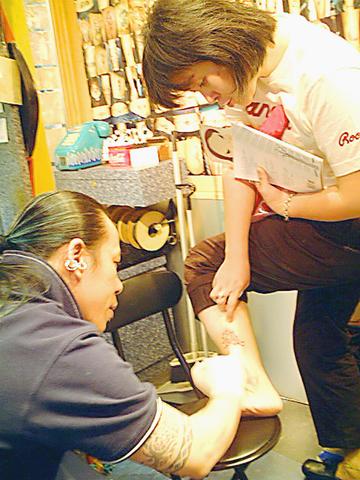
PHOTO: DAVID MOMPHARD, TAIPEI TIMES
"No, I'm fine. I'm ready," she says sliding her pants down past her birthmark and sidling onto a stool. Damao grabs a ballpoint pen and, with a few strokes, sketches the lizard to life. "Is here good?" he asks. "How's the size?"
"It's fine, It's good," she says.
"You're sure?"
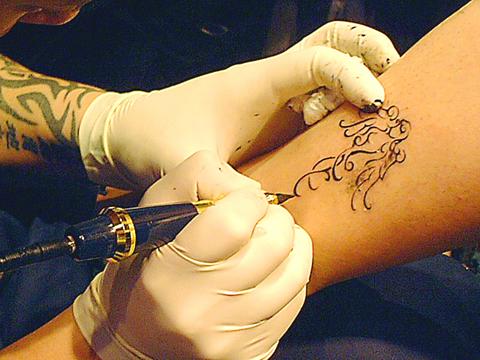
PHOTO: DAVID MOMPHARD, TAIPEI TIMES
She's sure.
Damao gives a brief rundown of the proceedings while snapping latex gloves onto his hands.
"You'll need to keep a tissue on it for about 20 minutes afterwards," he says unwrapping a fresh needle, "otherwise the ink may stain your pants."
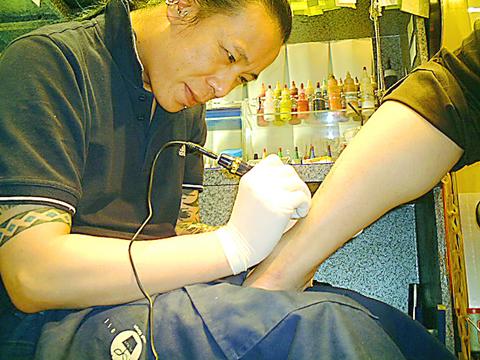
PHOTO: DAVID MOMPHARD, TAIPEI TIMES
He inspects the point of his point needle against the white of his gloves and tosses it in the trash bin, unwraps another and, after inspection, slides it into the end of his drill.
"It shouldn't take more than 10 or 15 minutes."
He drips a tiny amount of black ink into a thimble on his desk, dips the needle, and the drill begins to buzz.
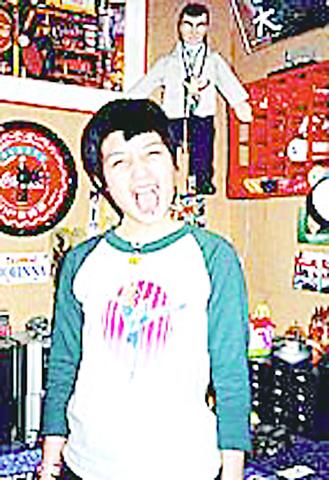
Pei-fang curses through clenched teeth. Her green complexion of a moment ago turns dark red, then purple. Her knuckles are white from gripping the seat of her stool.
"Are you going to be okay?" Damao asks her.
"Don't mind me," she says.
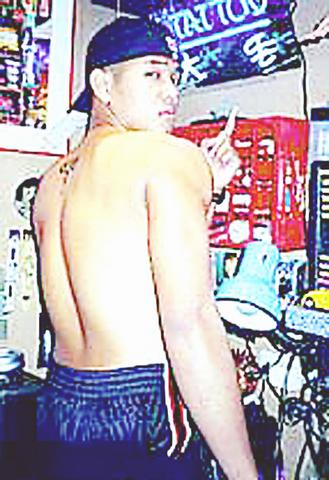
Damao continues drilling and talking to Pei-fang, keeping the banter light.
He's the most sought-after tattoo artist in Taiwan with a lengthy client list of celebrities and models. Japanese pop stars fly all the way to Taiwan to be marked up by him. Tattoo enthusiasts in the US sign up a year in advance of his annual vacation pilgrimage to Las Vegas to receive a style of tattoo that's otherwise hard to find. But for all his skill with a drill, Damao is equally adept at making his clients feel comfortable while a needle rips into their flesh.
"Uh oh!" he blurts out, turning off the drill and turning Pei-fang white.
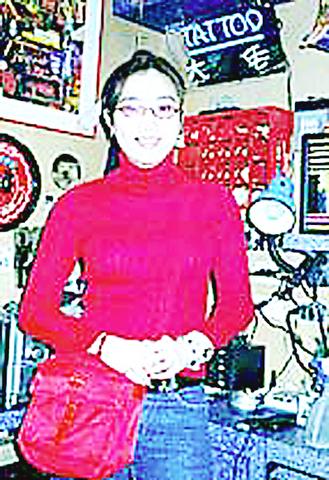
"Just joking!" he says with a laugh and contagious smile. With that, Pei-fang unclenches and giggles for the first time since she walked into the room, but her laughter is cut short by a spritz of rubbing alcohol to her freshly scarred thigh.
"AIEEEEE! Tell me before you do that next time!" she fumes.
Damao is still laughing. He makes quick work of the rest of the lizard, wipes away the excess ink and applies a dollop of Vaseline and a tissue. A few minutes later, Pei-fang is happily sporting a lizard that only those closest to her will ever see. She pulls up her pants and takes out NT$2,000 from the front pocket.
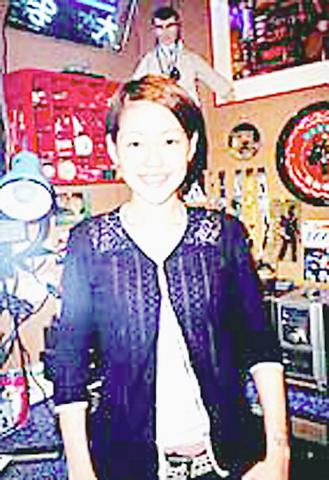
Colorful character
"I don't think of tattooing as work," Damao says. "It's very special. People come to me with something they want to wear all their lives -- a drawing or maybe just an idea -- and I help them realize it. I also have an obligation to them to make sure that they're sure it's truly what they want. They're customers when they walk in, but they're friends when I see them again."
Pei-fang, he explains, first came to his studio several weeks ago to get her first tattoo. She was made to wait a month; common procedure for all first-timers. Others are even turned away if Damao doesn't like the tattoo they want or if they want it in a place he thinks is
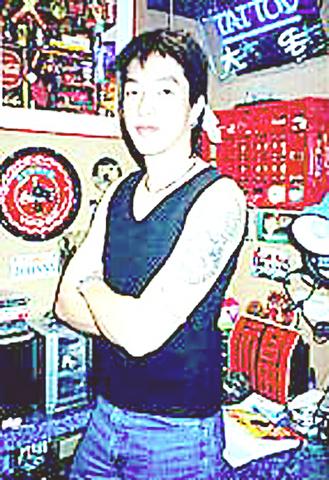
inappropriate.
"I know good people who cannot get a good job because they have very visible tattoos," he says. "I worry when people leave my shop after getting a tattoo. I don't stop worrying until I see them again and see that they're still happy with it. ... Most of my new clients are introduced to me by my previous clients."
This is an uncommon practice for Taiwan's burgeoning league of tattoo artists. In the past decade, a number of tattoo parlors have opened in the alleyways through Taipei's Hsimenting district where passersby can stop and stare.
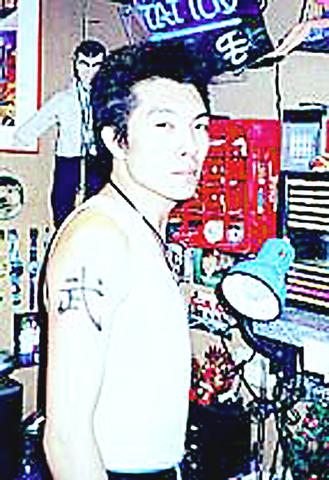
They're handed photo albums of the artists' previous works and asked what kind of tattoo they might like. The soft sell is punctuated with words like "cool" and "sexy."
By contrast, Damao's studio, Master Tattoo, is on the fourth floor of a shopping plaza in Hsimenting where he works behind closed doors. The only things passersby have to gawk at are the dozens of photos of his clients, whose tattoos aren't as apparent as their smiles.
Anyone rubbernecking into his studio is asked to come back when he's free or else call. He'd rather not be watched while he's working and is admittedly camera-shy. He's drawn sunglasses and facial hair on every photo on his wall in which he appears.
"There are those who've realized that, because tattoos have become more fashionable, there is a lot of money to be made. They want to make money. ... They work on the street where everyone can see. If you like what you see, you can get a tattoo that same day. You can even get the exact same tattoo you see in one of their books. My clients would kill me if they saw their own tattoo on someone else. ... I don't work like that."
Tattooing's rise in popularity has given Damao cause for concern. The art form is a very personal matter for him and it's his hope, he says, that his clients' tattoos are a very personal matter for them.
"I've had many people in their early 20s come in and inquire about tattoos, describe what they want and ask if I draw temporary tattoos, so they can see how they like it. I don't draw temporary tattoos," he says. "When you wear a temporary tattoo, you know it's going to come off in a few days. It's a different way of thinking than if you want to wear something that will be there all your life."
Artistic integrity
Damao's next client has just arrived. Wen-ling is having her second tattoo, an angel, drawn onto her left ankle. In stark contrast to Pei-fang, she's relaxed and talkative. Damao starts first with his ballpoint pen, then the drill. Wen-ling doesn't flinch. She's flipping through a magazine and chattering incessantly. Anyone walking by might think she were getting a pedicure instead of a tattoo. She flips through a magazine she's brought with her and shows Damao a picture of Doraemon -- her next tattoo, she says -- that she'd like on the outside of her forearm. Her words sound an alarm to Damao, who suggests that the inside of her forearm might be a better, "cuter" location. Wen-ling seems to think it's a good idea and wonders aloud when she could schedule a time.
"Let's finish this one before we think about another," Damao says, putting off the issue for another day, and maybe another tattoo parlor; he clearly doesn't fancy carving a cartoon character into someone's forearm.
He lights a Lucky Strike after finishing Wen-ling's angel and collecting his fee. He's worn the friendliest of smiles all day but now it's gone. A thousand black drawings of devils, snakes, dragons and beasts hang on the walls of his closet-sized studio, giving him a sinister halo. Flames and Chinese text are carved into his arm. Piercings hang from his ears. A steel stud protrudes from his lower lip and without his smile his face is cold and serious. Then, as quickly as it went away, his smile returns and the beasts and devils disappear into the woodwork.
"Doraemon," he says with a chuckle. "Please."
Master Tattoo is located at 4F, 72-1 Hsining S. Rd., Taipei

June 23 to June 29 After capturing the walled city of Hsinchu on June 22, 1895, the Japanese hoped to quickly push south and seize control of Taiwan’s entire west coast — but their advance was stalled for more than a month. Not only did local Hakka fighters continue to cause them headaches, resistance forces even attempted to retake the city three times. “We had planned to occupy Anping (Tainan) and Takao (Kaohsiung) as soon as possible, but ever since we took Hsinchu, nearby bandits proclaiming to be ‘righteous people’ (義民) have been destroying train tracks and electrical cables, and gathering in villages

Swooping low over the banks of a Nile River tributary, an aid flight run by retired American military officers released a stream of food-stuffed sacks over a town emptied by fighting in South Sudan, a country wracked by conflict. Last week’s air drop was the latest in a controversial development — private contracting firms led by former US intelligence officers and military veterans delivering aid to some of the world’s deadliest conflict zones, in operations organized with governments that are combatants in the conflicts. The moves are roiling the global aid community, which warns of a more militarized, politicized and profit-seeking trend

The wide-screen spectacle of Formula One gets a gleaming, rip-roaring workout in Joseph Kosinski’s F1, a fine-tuned machine of a movie that, in its most riveting racing scenes, approaches a kind of high-speed splendor. Kosinski, who last endeavored to put moviegoers in the seat of a fighter jet in Top Gun: Maverick, has moved to the open cockpits of Formula One with much the same affection, if not outright need, for speed. A lot of the same team is back. Jerry Bruckheimer produces. Ehren Kruger, a co-writer on Maverick, takes sole credit here. Hans Zimmer, a co-composer previously, supplies the thumping

Dr. Y. Tony Yang, Associate Dean of Health Policy and Population Science at George Washington University, argued last week in a piece for the Taipei Times about former president Ma Ying-jeou (馬英九) leading a student delegation to the People’s Republic of China (PRC) that, “The real question is not whether Ma’s visit helps or hurts Taiwan — it is why Taiwan lacks a sophisticated, multi-track approach to one of the most complex geopolitical relationships in the world” (“Ma’s Visit, DPP’s Blind Spot,” June 18, page 8). Yang contends that the Democratic Progressive Party (DPP) has a blind spot: “By treating any